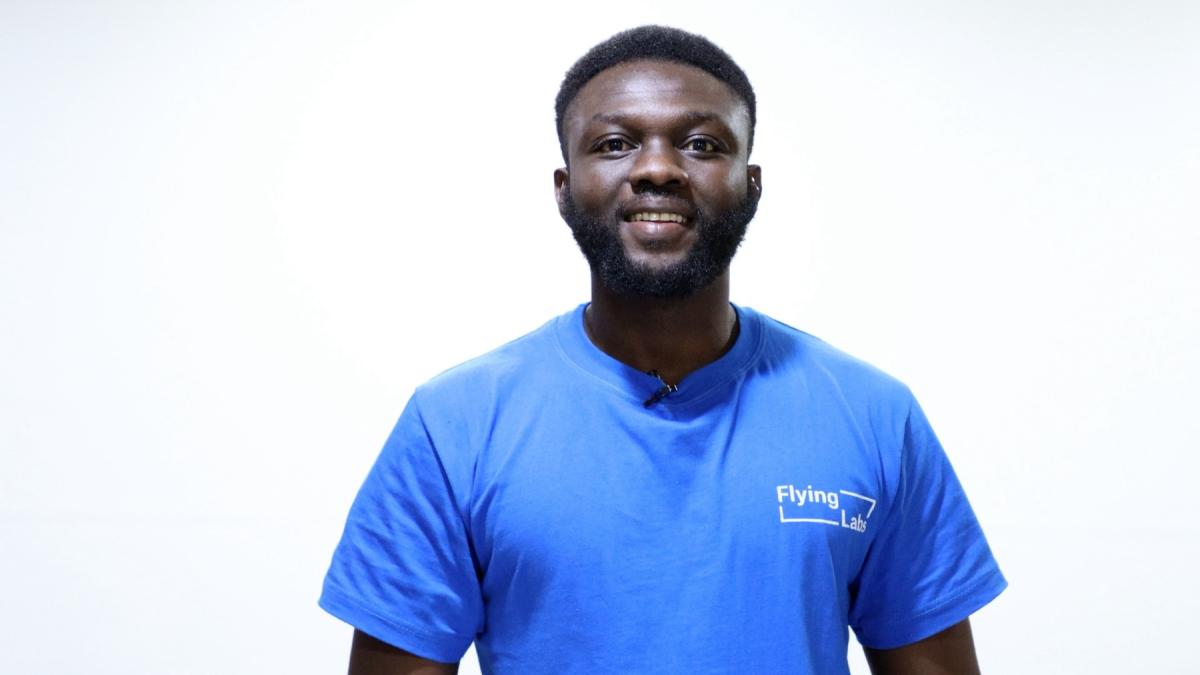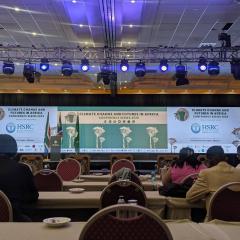
Turning Data Into Action Takes Time: Claudel’s Journey to Resilience
June 13th, 2024

It would not be an overstatement to say that Claudel Guiella, Burkina Faso Flying Labs’ IT Technician and Training Coordinator, was a little on edge. Each week seemed to bring a new challenge he was not sure how to surmount. A partner his team needed for data collection was nowhere to be found, despite numerous emails and messages. Then, a key stakeholder was unable to engage with his employees, stalling the project’s progress. To top it all off, the field data they had gathered so far left much to be desired, casting doubt on the value of the entire project. As the project deadline loomed closer, Claudel had to wonder whether it would be so bad if they simply threw in the towel. Surely, worse things could happen, right? So what if he conceded that they had bitten off more than they could chew?
Burkina Faso Flying Labs was on a mission to demonstrate the value of drone technology as a tool for topographic surveying. Supported by the Turning Data Into Action (TDIA) microgrant facilitated by WeRobotics, the team was collaborating with Projet de Développement Hydroagricole de Soum to identify innovative applications for drone technology in the development and management of irrigated schemes in Burkina Faso. As the project lead, Claudel was responsible for identifying the project scope, engaging with stakeholders, gathering, processing, and analyzing data, and overseeing the project from start to finish. In order to prove to decision-makers that drones were the more economical solution, Claudel and his team went into the field to collect data for a study that would compare drone technology with the techniques already used by stakeholders.
Their first victory came with the confirmation that using drones did indeed allow them to undertake topographical surveys in much less time, with less equipment, and with a smaller team, thus drastically reducing operational costs. They were off to an excellent start.
But then emerged an obstacle they could not overlook. The accuracy of their results was wanting. They needed to reach survey-grade accuracy, which would meet industry requirements. Undeterred, they tried to identify the problem and returned to the field. Their results were better but still unsatisfying. Claudel saw that they had two options. They could accept that this was as good as it was going to get, potentially undermining their entire project, or they could embrace the discomfort of growth and push further.
WeRobotics’ TDIA program was born of the realization that the data produced by the Flying Labs often ended up under-utilized because stakeholders in the local communities did not know how to make use of it. Bridging this gap meant equipping Flying Labs with the tools and techniques with which to work in close collaboration with local stakeholders and improve their ability to read and use drone data. In the end, it is this emphasis on stakeholder engagement that illuminated Claudel’s way through his TDIA journey.
From the beginning, the TDIA program was there with recommendations, with incredible tools. One recommendation that greatly impacted our work was simply staying in touch with the stakeholders…The mobilization of stakeholders remains the most important takeaway for me. It had the sort of direct consequences that ultimately changed how I will implement projects in the future.
— Claudel Guiella, IT Technician and Training Coordinator, Burkina Faso Flying Labs
When the team faced issue after issue in the execution phase, consistent communication with stakeholders allowed them to navigate and resolve them effectively. Without this constant engagement, the journey would have been much more difficult, Claudel attests. Collaboration and knowledge sharing became vital, allowing Burkina Faso Flying Labs to draw on the expertise and experiences of others to grow and move forward.
You will need to give cookie consent in the Experience option to see this video. Click the cookie link at the bottom right of the page to change your preferences.
As Claudel and his colleagues faced and found ways to overcome hurdle after hurdle, it was the change in their resilience that shone brightest. A pivotal moment was a key insight from the TDIA program: “Turning data into action takes time.” This simple yet profound statement reframed the experience for him, transforming his approach to problem solving and project management. In his perspective, this resilience is what ultimately saved the project.
Before, I would tell myself, ‘Oh another problem.’ But now, when I'm facing an unexpected event, I say, it's just part of the process. It's normal.
— Claudel Guiella, IT Technician and Training Coordinator, Burkina Faso Flying Labs
Burkina Faso Flying Labs went on to complete their project with great success. They conducted additional research, collaborated with other local experts, refined their data processing techniques, and achieved the required accuracy. They began with the question, “Why adopt drone technology in the management of irrigated schemes in Burkina Faso?” They ended with a comprehensive answer.
Reflecting on the project, Claudel views the team’s resilience within the context of greater community resilience. Burkina Faso Flying Labs’ mission is to improve socio-economic resilience within local communities; if they themselves could not demonstrate resilience, it would be a loss to their credibility. Resilience, then, is essential to the work of driving change for social good. Resilient people build resilient communities. To create positive impact is to face tremendous difficulty because this work is neither simple nor easy. But when we keep our eyes on the ultimate goal, we can call on our spirit of resilience to fortify ourselves for the work before us and build a better world brick by brick.
To make a change, you have to try again and again. Now it's part of me: try and try until you succeed. It's now a part of the way I approach all aspects of my life – not just in the work of drones for social good but in my entire mindset.
— Claudel Guiella, IT Technician and Training Coordinator, Burkina Faso Flying Labs
Category(s):
- Local Experts
- Impact Story
- Drones, Data and AI for Agriculture
- Drones, Data and AI for Climate Action
Location(s):
Recent Articles

